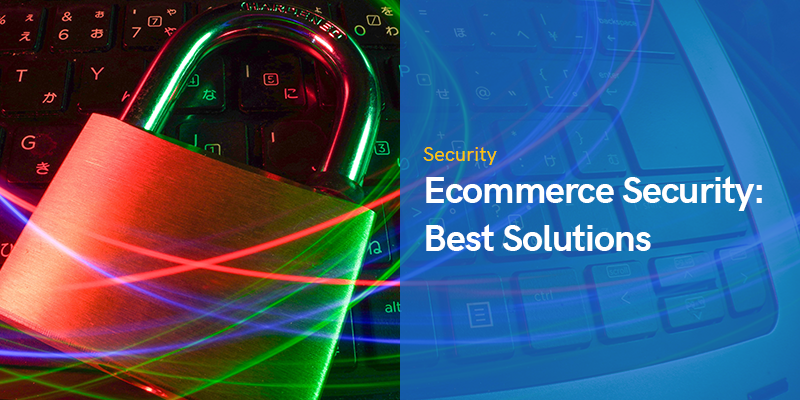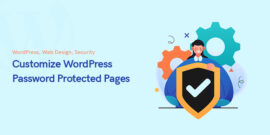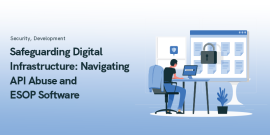
Ecommerce Security in 2023: Best Solutions
Consumers may abandon a website if they feel that the website is unsafe. Even Amazon's stores or small and medium-sized eCommerce sites are not exempted from Cyberattacks.
It is crucial to hire software service providers that are reliable and experts in providing eCommerce security for your business.
SaaS development services provide safe software solutions, and they have extensive experience developing feature-rich eCommerce and retail systems for online stores and marketplaces.
Popular Type of Cyber Attacks and the Best Countermeasures
There are several hazards to your online shop that you must guard. Let's look at some of the most frequent ones that affect internet enterprises and the best solutions to these cyber attacks.
Financial Frauds – Protecting Your Online Store and Customer Data
Ecommerce is a huge business, but unfortunately, so is cybercrime.
According to one FBI report, a total of $10.3 billion was lost through online scams in 2022, with data breaches being the second most prevalent cause of losses after phishing scams.
Because of the large volumes of private customer information handled by online stores, eCommerce businesses can be an attractive target for fraudsters and cybercriminals looking to make a profit by stealing sensitive data.
A single breach can not only cost you and your customers huge amounts of money, but also cause serious damage to your reputation as a brand which it can be extremely difficult to recover from.
As an eCommerce business owner, you need to be acutely aware of the scope of cybersecurity threats and take active steps to ensure you’re protecting customer data as effectively as possible.
In this guide, we’ll look at some of the essential pillars of eCommerce security that you should be implementing at your business.
Internet businesses have been plagued by financial fraud. Hackers conduct unlawful transactions and delete the trail, causing organizations to suffer considerable losses.
Some scammers will also make claims for bogus refunds or returns.
Solution: the HTTPS sign is a good security indicator, indicating that the website employs an SSL certificate. However, it is not the final say on security. As an eCommerce shop, you should spend on PCI DSS certification since it helps you boost payment security, eliminate sales dead ends, and increase client trust in you.
Have Robust Data Gathering Policies
The way you collect data as an eCommerce business can have a tremendous effect on how your brand is perceived by its core audience, as well as the level of cybersecurity risk facing your brand.
When you’re only collecting data that’s absolutely essential to your customer experience and marketing drives, you’ll not only avoid making your business an attractive prospect for cybercriminals but fortify customer confidence by showing that you’re committed to keeping their information safe.
To build robust policies for protecting customer data, you should start by carrying out a thorough audit of all the data you typically collect during the customer journey. Look at your current data-gathering processes with a critical eye, and ask yourself if opting not to collect this data would affect your eCommerce operations in a way that drastically harms the customer experience.
A customer’s basic contact information, their delivery and billing addresses, and wishlist items are all either necessary or helpful for providing customers with a positive experience on your site, and won’t increase the risk of your site falling victim to a breach. Precise geolocation data, for example, generally won’t be necessary for providing eCommerce customers with the experience they expect from you, and so shouldn’t be a part of your data-gathering activities.
A thorough review of your current data collection should highlight a number of data sets that can be struck from your activities, and inform explicit data-gathering policies that will help minimize the risk of a data breach.
Phishing
It is a threat in which hackers act as legal companies and send emails to your customers to trick them into disclosing information.
Proffering them with a bogus copy of your legitimate site or anything else makes the customer think the proposal is coming from the company.
Solution: the first step toward phishing prevention is to inform your customers. Educate them on the best security techniques to use. Inform them about the necessity of using strong passwords and the dangers of opening fraudulent emails or downloading malicious content.
Implement Role-Based Access Control
Another important precaution is to limit access to your data.
Just as it’s not necessary to gather every possible dataset from your customers, it’s not necessary for every member of your team to have access to the data you gather. Every access point where someone is able to log into your analytics tools can be a potential area of weakness.
For example, if a sensitive account is protected with a weak password, it could be at risk of falling victim to a brute force cyber attack.
Implementing role-based access control at your eCommerce business is an effective way to ensure you’re not leaving yourself open to cyber security risks. This is a system of controlling the kinds of data an employee can and cannot access based on what’s necessary for them to perform in their role.
In a typical role-based access control setup, you’ll be able to create and manage different role groups with customised permissions to access different sets of data, and easily add or remove different logins to these groups according to what they need to do their jobs.
This will not only help with your security and compliance as a business, but can also reduce the need for admin work when someone joins or leaves your team.
Spam
Whereas emails are considered a vital channel for increased sales, they are also one of the most commonly utilized media for spamming.
They frequently send them through your social networking site's inbox and wait for you to click it. Furthermore, spamming jeopardizes your website's security and endangers its performance.
Solution: the most straightforward solutions for this scenario are having spam filtering systems, investing in staff training, and installing anti-virus software.
DDoS Attacks
DDoS (Denial of Service) and DOS (Distributed Denial of Service) attacks are designed to disrupt your website and reduce total sales. These attacks bombard your servers with queries until they can no longer handle them and your website collapses.
Solution: while these sorts of attacks are uncommon, they are nonetheless hazardous.
A DoS protection service is the best technique to combat such attacks. Through DoS protection it continually prevents any fraudulent entries to your online business.
Obtain and Maintain an SSL Certificate
SSL (Secure Socket Layer) certificates are considered a crucial security layer for any website that handles sensitive information from its users.
This security protocol works to encrypt the traffic of information between a web browser and a server, making it much harder for hackers to intercept private data.
Aside from being an effective pillar of eCommerce security, SSL certificates will also give your website HTTPS status on your users’ web browser, making your eCommerce site more trustworthy and improving the user experience.
If you don’t have an SSL certificate already, you can get one for your website easily through a variety of reputable domain name registrars or managed hosting providers.
Though SSL is considered a rudimentary part of cybersecurity, there are still many hosts and web-builder tools that don’t include this as a basic part of their solutions, so be sure to check this as part of your drive for better security.
Get PCI DSS-compliant
PCI DSS stands for the “Payment Card Industry Data Security Standard”. It’s a set of online security measures recommended for any business that takes card payments online and is an essential pillar of eCommerce security for any modern online store.
The requirements of PCI DSS compliance are maintained by the PCI Security Standards Council, and include 12 technical and operational requirements. These include, but are not limited to:
- Installing and maintaining a firewall.
- Encrypting the transfer of any customer data across public networks.
- Assigning unique IDs to anyone who accesses sensitive data handled by your business.
- Restricting access to cardholder data.=
- Maintaining explicit security policies for all employees at your business.
This security measure is a universally respected minimum for eCommerce businesses, not to mention a useful tool for creating security checklists and audit frameworks to ensure your business maintains robust security measures on an ongoing basis.
If you have any concerns about protecting customer data at your eCommerce business, getting familiar with PCI DSS requirements is a great place to start.
Use a Password Management Tool
As we mentioned earlier, the various access points to sensitive data can present vulnerabilities to cyber attacks if they’re not properly secured.
In many cases, people won’t use sufficiently strong passwords on their accounts as they’re hard to remember, but equipping your eCommerce team with a password management tool will make it easier to protect your access points with stronger, harder-to-hack passwords.
An effective password management tool will create and organize complex passwords for the tools that your team uses to carry out their duties, using encryption to make passwords unreadable for anyone who hasn’t been given the encryption key.
This way, even if a hacker is able to break into your password management tool, they’ll find the passwords unreadable and unusable. Meanwhile, your team will be able to easily pull strong passwords from the password manager tool whenever they need them, without the effort of creating and recalling highly complex passwords that will be safe from password attacks.
Carry Out Regular Audits and Assessments
Unfortunately, the world of cyber security isn’t static. Once you’ve added a number of security layers to your eCommerce website, you’ll need to revisit the subject periodically to check you’re protecting customer data effectively.
To ensure your security stays as robust as possible, you’ll need to schedule regular security audits and self-assessments that look at the various facets of your eCommerce security setup and review how well they’re performing.
First, decide how often you can practically carry out these audits. As an eCommerce business, you should aim to carry out an audit at least once per year, though it’s common for online stores to carry out assessments bi-annually or even quarterly.
Next, take some time to review the cybersecurity areas that you’ll be reviewing, and create clear checklists and SOPs in order to standardize the process.
Some important steps involved in an eCommerce security audit might include:
- Review your security baseline, including the security layers you’re currently maintaining, the data you’re collecting, and how you’re storing it.
- Check the state of access controls and permissions, including the datasets that various teams and individuals have access to, and the permission controls you’re using to ensure that sensitive data is only accessible to the people who need it to do their jobs.
- Reviewing the level of data access that third-party vendors have to your data, and whether or not this access is limited to what’s strictly necessary.
- Assessing your incident response policies, including the systems you have for detecting cyber security threats and how you’ll effectively deal with them should they arise.
- Checking your compliance with any relevant privacy laws and regulations, such as CCPA, GDPR, and PCI DSS.
Keeping on top of robust eCommerce security audits requires having a reliable scheduling tool.
MEC is a versatile WordPress calendar plugin ideal for scheduling virtual, in-person, and hybrid events for your small business. Discover the Power of Modern Events Calendar here.
Protecting You and Your Customers
The cybersecurity threats landscape is a major challenge for all eCommerce businesses, and requires a proactive approach to protecting customer data.
By integrating robust security layers, staying familiar with your team’s roles as they relate to sensitive data, and regularly reviewing your approach to security, you can keep your business and customers safe from a range of security threats and keep your eCommerce operations running smoothly.
Brute Force Attacks
These attacks aim to brute-force your password by targeting your online store's admin panel. It employs programs that connect to your webpage and attempt to break your password using every available combination. Use a solid and complicated password to defend yourself from such attempts. Remember to replace it regularly.
Solution: there is a simple answer to this type of assault. All you can do is change your password regularly and develop complex and intricate passwords.
Bots
Bots scan the web and assist you in optimizing your website in Search Engine Result Pages. There are, however, dedicated bots that scrape websites for cost and inventory information. Such information is used by hackers to alter the pricing of your internet business or to get the best-selling items in shopping carts, leading to a drop in sales and profits.
Solution: when it comes to bot attacks, the actual threat is that they closely resemble human behavior. As a result, spotting a bot becomes more difficult. While it may be challenging to identify a bot, a powerful server firewall may help keep unwanted traffic at bay.
Cross-Site Scripting
Cross-site scripting is infiltrating your retail site with malicious code and hacking your website users. By establishing a Content Security Policy, you can protect yourself against it.
Solution: for this form of security assault, there is no remedy. The only way to avoid this is to prevent it from happening in the first place. Use the assistance of security specialists to set up safety measures.
Wrapping Up
Being aware of the risks in your eCommerce site is a wise move. Online retailers do not appear to have a chance of winning this race unless they have adequate and up-to-date security mechanisms in place.
Recommended Posts
Understanding Website Content Security Policy in 2024
January 10, 2024

5 Ways to Customize WordPress Password Protected Pages
December 11, 2022

